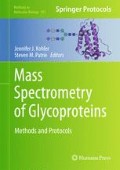Abstract
Membrane-associated glycoproteins play critical roles in many biological processes and are often the therapeutic targets for drug discovery. Lectin affinity chromatography is one of the most widely used approaches for enrichment of glycoproteins at the protein level. Here, we describe a strategy for the characterization of membrane glycoproteins including membrane protein extraction, lectin affinity chromatography, protein digestion, and analysis by LC-MS/MS.
Access this chapter
Tax calculation will be finalised at checkout
Purchases are for personal use only
References
Gahmberg CG, Tolvanen M (1996) Why mammalian cell surface proteins are glycoproteins. Trends Biochem Sci 21:308–311
Ashwell G, Harford J (1982) Carbohydrate-specific receptors of the liver. Annu Rev Biochem 51:531–554
Millette CF, Scott BK (1984) Identification of spermatogenic cell plasma membrane glycoproteins by two-dimensional electrophoresis and lectin blotting. J Cell Sci 65:233–248
Santoni V, Molloy M, Rabilloud T (2000) Membrane proteins and proteomics: un amour impossible? Electrophoresis 21:1054–1070
Wu CC, Yates JR III (2003) The application of mass spectrometry to membrane proteomics. Nat Biotechnol 21:262–267
Goldstein IJ, Hayes CE (1978) The lectins: carbohydrate-binding proteins of plants and animals. Adv Carbohydr Chem Biochem 35:127–340
Ghosh D, Krokhin O, Antonovici M, Ens W, Standing KG, Beavis RC et al (2004) Lectin affinity as an approach to the proteomic analysis of membrane glycoproteins. J Proteome Res 3:841–850
Hart DA (1980) Lectins in biological systems: applications to microbiology. Am J Clin Nutr 33:2416–2425
Dai Z, Zhou J, Qiu SJ, Liu YK, Fan J (2009) Lectin-based glycoproteomics to explore and analyze hepatocellular carcinoma-related glycoprotein markers. Electrophoresis 30:2957–2966
He J, Liu Y, Xie X, Zhu T, Soules M, DiMeco F et al (2010) Identification of cell surface glycoprotein markers for glioblastoma-derived stem-like cells using a lectin microarray and LC-MS/MS approach. J Proteome Res 9:2565–2572
Keller A, Nesvizhskii AI, Kolker E, Aebersold R (2002) Empirical statistical model to estimate the accuracy of peptide identifications made by MS/MS and database search. Anal Chem 74:5383–5392
Nesvizhskii AI, Keller A, Kolker E, Aebersold R (2003) A statistical model for identifying proteins by tandem mass spectrometry. Anal Chem 75:4646–4658
Schiess R, Mueller LN, Schmidt A, Mueller M, Wollscheid B, Aebersold R (2009) Analysis of cell surface proteome changes via label-free, quantitative mass spectrometry. Mol Cell Proteomics 8:624–638
Garner AE, Smith DA, Hooper NM (2008) Visualization of detergent solubilization of membranes: implications for the isolation of rafts. Biophys J 94:1326–1340
Wang Y, Ao X, Vuong H, Konanur M, Miller FR, Goodison S et al (2008) Membrane glycoproteins associated with breast tumor cell progression identified by a lectin affinity approach. J Proteome Res 7:4313–4325
Bradford MM (1976) A rapid and sensitive method for the quantitation of microgram quantities of protein utilizing the principle of protein-dye binding. Anal Biochem 72:248–254
Lotan R, Skutelsky E, Danon D, Sharon N (1975) The purification, composition, and specificity of the anti-T lectin from peanut (Arachis hypogaea). J Biol Chem 250:8518–8523
Acknowledgment
This work was supported by the National Cancer Institute under grant R21 CA124441 (D.M.L.), and the National Institutes of Health Grant No. R01 GM49500 (D.M.L.).
Author information
Authors and Affiliations
Corresponding author
Editor information
Editors and Affiliations
Rights and permissions
Copyright information
© 2013 Springer Science+Business Media, LLC
About this protocol
Cite this protocol
Liu, Y., He, J., Lubman, D.M. (2013). Characterization of Membrane-Associated Glycoproteins Using Lectin Affinity Chromatography and Mass Spectrometry. In: Kohler, J., Patrie, S. (eds) Mass Spectrometry of Glycoproteins. Methods in Molecular Biology, vol 951. Humana Press, Totowa, NJ. https://doi.org/10.1007/978-1-62703-146-2_6
Download citation
DOI: https://doi.org/10.1007/978-1-62703-146-2_6
Published:
Publisher Name: Humana Press, Totowa, NJ
Print ISBN: 978-1-62703-145-5
Online ISBN: 978-1-62703-146-2
eBook Packages: Springer Protocols

